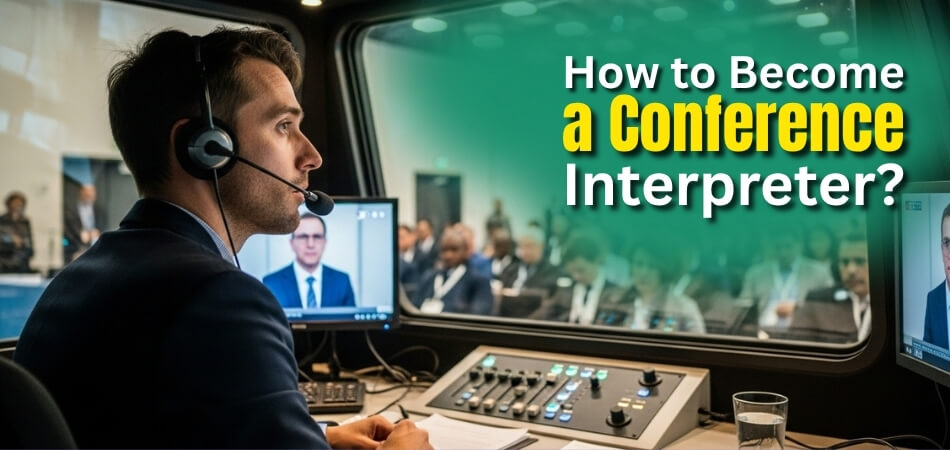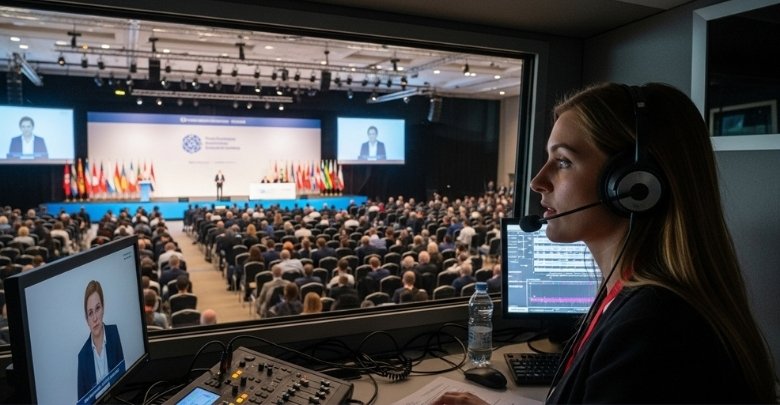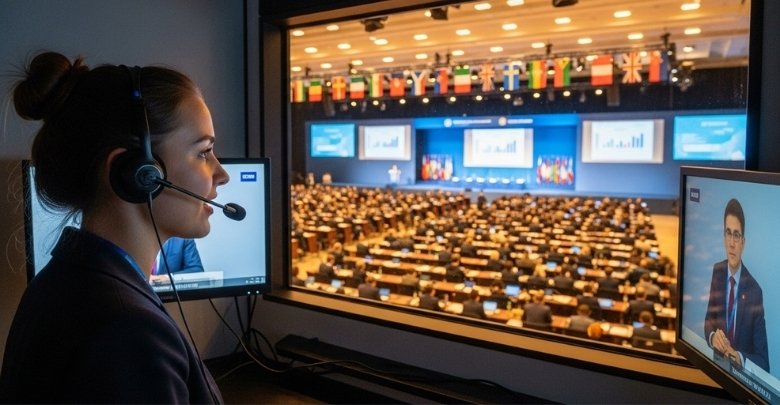Speaking across languages is more than translation; it’s about connecting people and ideas. Conference interpreters make this possible by instantly converting spoken messages between languages, ensuring understanding in global meetings, events, and negotiations. Their work enables collaboration across cultures and industries every day.
If you’re wondering how to become a conference interpreter, start by mastering at least two languages and developing strong communication skills. Most professionals acquire a relevant master’s degree and gain extensive experience to qualify for certification. This guide walks you through education, training, and practical steps to build confidence and succeed as a trusted voice in international communication.
How to Become a Conference Interpreter: Step-by-Step Process
Becoming a conference interpreter takes skill, dedication, and strong language ability. This process involves mastering multiple languages, understanding cultures, and learning to think quickly under pressure. Here’s how you can start your journey toward a professional interpreting career.

Step 1 – Strengthen Your Language Proficiency
Every great interpreter starts with language mastery. You’ll need to be fluent in at least two languages: your native language and one or more foreign languages. True fluency means understanding idioms, dialects, and tone.
How to do it:
- Read news and literature in your target languages.
- Watch live speeches or conferences with subtitles.
- Practice active listening by summarizing what you hear in another language.
Learning languages is a lifelong process, but it’s the foundation of this profession.
Step 2 – Obtain Relevant Education
While not every interpreter has a formal degree, most successful professionals study fields like linguistics, translation, or interpretation. A bachelor’s degree builds a strong base, while a master’s in conference interpreting offers specialized skills.
Universities across Europe, Asia, and North America offer programs recognized by professional bodies like the AIIC. Attending workshops or joining student interpreter networks helps you build early exposure.
If you’re attending a conference in Canada, the USA, or a similar international event, observe how interpreters work; it’s one of the best real-world learning experiences available.
Step 3 – Get Professional Training
Interpreting is a hands-on skill. Beyond academic study, you’ll need structured training focused on real-time interpreting, note-taking, and stress management.
Recommended paths include:
- Interpreter training schools (e.g., UN, EU-accredited programs)
- Online interpreting platforms that offer practice simulations
- Mentorship from experienced conference interpreters
You can also volunteer at academic or non-profit events to gain live experience and confidence.
Step 4 – Build Specialized Knowledge
Every conference has its own focus, law, business, healthcare, technology, or diplomacy. Specializing in one or more of these fields makes you a more valuable professional.
How to build subject knowledge:
- Study industry-specific terms in both your languages.
- Follow industry events and global policy discussions.
- Take short courses related to your preferred specialization.
A specialized interpreter is often the first choice for clients who need expertise and precision.
Step 5 – Earn Certifications and Accreditation
Professional credentials add credibility to your name. Many international organizations and agencies prefer certified interpreters because it ensures consistent quality.
Top certifications include:
- AIIC (International Association of Conference Interpreters)
- UN or EU interpreting exams
- National or regional interpreter accreditations
Each certification validates your skill and readiness for high-level interpreting assignments.
Step 6 – Gain Practical Experience
Nothing replaces real-world practice. Work your way up from smaller events to larger conferences. Internships with NGOs, universities, or local councils provide valuable exposure to live audiences.
Start small by interpreting for webinars, community meetings, or workshops. Record and review your sessions to analyze accuracy and delivery speed. Over time, these experiences will form a solid portfolio you can present to clients.
Step 7 – Build a Professional Network
Connections matter in the interpreting world. Join associations, attend conferences, and participate in online language communities. Networking with peers and professionals often leads to freelance opportunities or mentorship.
Pro Tip: Create a LinkedIn profile that showcases your language pairs, certifications, and notable interpreting projects. A well-presented online presence helps potential clients find and trust your expertise.
Step 8 – Start Your Career or Freelance Practice
Once you’ve gained training, certification, and some experience, you can choose between full-time employment and freelance interpreting.
- Agency route: Work with established interpreting agencies that assign projects to certified professionals.
- Freelance route: Build your own client base by marketing services to event organizers, corporations, and educational institutions.
Start by setting realistic rates and ensuring you maintain confidentiality and professionalism. Over time, consistent quality work will bring repeat clients and referrals. Freelancers may face irregular schedules or high workloads, but these challenges are manageable with organization and continued skill-building.
What Does a Conference Interpreter Do?
Conference interpreting is more than repeating words in another language; it’s about transforming ideas into clear, meaningful messages that everyone can understand. These professionals make global discussions possible. Let’s explore their core responsibilities and how their work differs before moving to the next section.
Bridging Communication Across Languages
Conference interpreters facilitate understanding among people who speak different languages. They translate spoken messages instantly, ensuring tone, intent, and cultural meaning remain accurate. Their work connects global participants, allowing ideas and decisions to flow smoothly without barriers.
How They Differ From Translators
Translators work with written materials, while interpreters handle live conversations. Interpreting requires real-time listening, processing, and speaking—often within seconds. This skill demands sharp focus, strong memory, and adaptability to ensure nothing important is lost in translation.
Typical Work Settings
Conference interpreters are found wherever international dialogue takes place. They work at diplomatic summits, global business meetings, academic seminars, and hybrid events. Whether in a booth or online, they help participants share ideas and negotiate effectively across languages.
Managing Complex Communication
A crucial part of interpreting is maintaining composure during high-pressure discussions. Professionals must handle rapid exchanges, technical jargon, and emotional tones without losing accuracy. Their ability to stay calm ensures clear and consistent communication throughout demanding sessions.
Interpreters handle a wide range of conference interpreting responsibilities, from preparing terminology glossaries to coordinating with event organizers. Their behind-the-scenes preparation ensures that every multilingual session runs smoothly from start to finish.
The role of a conference interpreter combines language mastery, cultural sensitivity, and real-time thinking. Their contribution ensures that global communication stays seamless and inclusive.
Why Choose a Career as a Conference Interpreter?
Conference interpreting is more than a language-based profession; it’s a career that opens doors to global experiences, cultural exchange, and lifelong learning. Interpreters play an essential role in international communication. Let’s explore what makes this profession so appealing before moving to the step-by-step guide on how to begin your journey.
Global Opportunities
Conference interpreters work with international organizations, corporations, and event planners. One day, you might assist world leaders at a diplomatic summit, and the next, interpret for researchers at a scientific forum. This variety ensures constant growth, exposure, and adventure in your professional life.
Intellectual Challenge
This career keeps your mind active and engaged. Interpreters must think quickly, adapt to different accents, and handle complex topics confidently. Every event brings new vocabulary and challenges, making each assignment an opportunity to test and refine your expertise.
Cultural Immersion
Few professions provide such direct exposure to diverse cultures. Interpreters regularly interact with people from different backgrounds, gaining deeper insights into global perspectives. Whether in person or virtually, these experiences enrich your worldview and improve your cross-cultural communication skills.
Growing Demand
With international meetings, virtual summits, and hybrid events becoming standard, the demand for skilled interpreters continues to rise. This growth creates consistent opportunities for trained professionals, ensuring strong job stability and flexible career choices around the world.
Choosing a career as a conference interpreter means choosing a life of continuous learning and connection. It’s a profession that challenges the mind while bridging people and cultures.
Essential Skills Every Conference Interpreter Needs
Fluency alone isn’t enough to succeed in conference interpreting. True mastery comes from a mix of mental agility, communication skills, and technical awareness. The following skills outline what truly separates professional interpreters from beginners and prepare us to explore how long it takes to develop them.
- Listening and Retention Skills: Interpreters must absorb and recall information instantly while translating in real time. This skill requires sharp concentration, quick thinking, and the ability to manage complex details under pressure.
- Public Speaking and Communication: Clear speech, confidence, and a steady rhythm help interpreters engage listeners effectively. Excellent communication ensures that the audience remains focused and understands every translated message.
- Cultural Awareness: Understanding cultural nuances helps interpreters preserve tone and respect between speakers. Awareness of gestures, idioms, and traditions ensures smooth communication that fits the cultural context of each event.
- Stress Management: Interpreting live events is mentally demanding. Effective stress control through preparation, short breaks, and focus exercises allows interpreters to stay calm and maintain clarity throughout long sessions.
- Technical Proficiency: Interpreters often work with headsets, microphones, and online platforms. Being comfortable with technology ensures uninterrupted sessions and the ability to adapt to both onsite and virtual interpreting environments.
These essential skills form the foundation of a successful interpreting career. By developing them consistently, interpreters can deliver high-quality communication across diverse settings.
How Long Does It Take to Become a Conference Interpreter?
Becoming a professional interpreter takes dedication and time, but the journey is rewarding for those passionate about languages and communication. The timeline depends on education, training, and experience. Here’s a clear breakdown of how long the process usually takes before we move to the next discussion on common challenges.
Year 1–2: Language and Academic Foundation
The first step involves developing strong language proficiency and academic grounding. Students focus on mastering multiple languages, improving comprehension, and building vocabulary. During this period, studying linguistics or translation lays the groundwork for interpreting skills.
Year 3–4: Specialized Training and Certifications
Once language fluency is achieved, interpreters move into professional training programs. This stage includes advanced interpreting techniques, simulated practice, and exposure to real-world settings. Earning certifications from recognized bodies adds credibility and prepares candidates for professional assignments.
Year 5–6: Practical Experience and Networking
By this stage, aspiring interpreters gain hands-on experience through internships, volunteer projects, or entry-level assignments. Building industry connections, attending events, and joining professional associations help in finding opportunities and establishing a reputation in the field.
On average, it takes three to six years to become a qualified conference interpreter. This journey blends study, practice, and persistence. With consistent effort and curiosity, aspiring interpreters can turn their language passion into a respected global profession.
Challenges and Realities of the Profession
Behind the rewarding nature of conference interpreting lies a demanding reality that tests both skill and endurance. Interpreters often juggle mental focus, emotional balance, and technical precision in high-pressure situations. Here are some of the most common challenges professionals face and how they manage them effectively.
Mental Fatigue
Interpreting requires constant focus and rapid decision-making. Listening, processing, and translating in real time can be exhausting. To maintain clarity, interpreters often work in pairs, alternating every 20 to 30 minutes to ensure sustained accuracy and mental freshness throughout long events.
Technical Glitches
Technology is both a support and a risk in modern interpreting. Poor audio quality, unstable connections, or faulty equipment can interrupt communication. Thorough pre-event testing, backup systems, and coordination with technicians are vital to minimize disruptions and maintain professional standards.
Unpredictable Workload
Freelance interpreters often face inconsistent schedules. Some months overflow with projects, while others are quiet. Successful professionals manage this by budgeting wisely, diversifying clients, and using downtime for training or skill development to maintain career stability.
Emotional and Cultural Challenges
Interpreting across sensitive or emotionally charged topics requires composure and neutrality. Cultural nuances or distressing content can be draining, so interpreters rely on self-awareness, empathy, and rest to maintain professionalism and emotional balance.
Conference interpreting is as demanding as it is rewarding. Every challenge, mental, emotional, or technical, reflects the conference interpreting career difficulties that form interpreters into resilient professionals capable of handling global communication with confidence and grace.
Future of Conference Interpreting
The interpreting industry is entering an exciting new era shaped by innovation, remote collaboration, and global accessibility. Emerging trends are redefining how interpreters work, learn, and connect with audiences. Explore the key developments forming the future of this profession and discover what skills will keep interpreters ahead of the curve.
AI and Remote Platforms
Artificial intelligence continues to support interpreters with features like live transcription, terminology databases, and speech recognition tools. While these innovations increase speed and consistency, human interpreters remain essential for emotion, nuance, and cultural understanding that technology cannot replicate.
Hybrid Event Growth
Hybrid events now dominate the conference landscape, combining in-person and online participation. This shift provides interpreters with flexible work options and broader exposure to global audiences, allowing professionals to serve more clients without being limited by geography.
Sustainability and Accessibility
Remote interpreting contributes to sustainability by minimizing travel emissions and resource use. It also enhances inclusivity by allowing organizations to reach speakers and attendees from various locations, making conferences more diverse and environmentally conscious.
Continuous Skill Development
Interpreting is becoming increasingly interdisciplinary, combining language mastery with technology and cultural insight. Future interpreters who continue learning through training, certifications, and digital tools will stay adaptable and competitive in this dynamic field.
The future of conference interpreting lies at the intersection of human expertise and digital innovation. Those who embrace lifelong learning, cultural awareness, and emerging technologies will thrive as global communication continues to evolve.
FAQs About Becoming a Conference Interpreter
Choosing a career in conference interpreting often raises practical questions about education, skills, and professional growth. This section answers the most common doubts aspiring interpreters have. Explore these insights to gain a clearer understanding of what it takes to succeed in this dynamic profession.
What Does a Typical Workday Look Like for a Conference Interpreter?
A day may include preparing terminology lists, reviewing speeches, attending live sessions, and coordinating with event teams. Interpreters often switch between active interpreting, note-taking, and post-session evaluations to ensure high-quality delivery.
How Do Interpreters Prepare Before an Event?
Preparation involves studying the event’s topic, reviewing speaker materials, and learning industry-specific vocabulary. Many interpreters also request agendas and presentation slides in advance to anticipate potential terminology challenges.
What Languages Are in Highest Demand for Conference Interpreting?
While English, French, and Spanish remain dominant, demand for Arabic, Mandarin, Portuguese, and Korean is rising. Rare languages such as Swahili or Bengali are increasingly valuable in international conferences and global business contexts.
Is Freelancing or Agency Work Better for Interpreters?
Both paths have advantages. Freelancers enjoy flexibility and control over their schedules, while agencies provide steady assignments and logistical support. Many interpreters start with agencies before transitioning to independent work.
What Personality Traits Help Interpreters Succeed?
Strong focus, quick thinking, emotional control, and adaptability are essential. Interpreters must handle pressure gracefully, stay composed under time constraints, and maintain confidence even in unpredictable situations.
Do Interpreters Need to Travel Frequently?
Many interpreters travel for global events, summits, and forums. However, with hybrid and online formats gaining popularity, professionals can now work remotely without always needing to travel internationally.
How Can New Interpreters Gain Experience Without Formal Jobs?
Beginners can volunteer at community events, academic seminars, or online conferences. These opportunities help build real-world experience, expand portfolios, and develop connections within the interpreting industry.
What Are the Career Growth Opportunities in Interpreting?
With experience, interpreters can specialize in niche fields such as diplomacy, law, or medicine. Others transition into teaching, translation, or project management roles within international organizations and agencies.
How Important Is Voice and Delivery in Interpreting?
Clear articulation, controlled tone, and consistent pacing make interpretation easier to follow. Many professionals train their voices through speech exercises to maintain clarity during long sessions.
Can Interpreters Work Across Different Time Zones?
Yes. With online interpreting platforms, professionals frequently handle global events across multiple time zones. Proper scheduling and time management are crucial to maintaining focus and performance in such cases.
Conclusion
Conference interpreting stands as one of the most vital professions in global communication, turning language barriers into bridges of understanding. It enables meaningful collaboration, international dialogue, and shared progress by ensuring that every voice is heard clearly, regardless of language or culture.
Learning how to become a conference interpreter is more than pursuing a career; it’s about mastering a craft that connects people and ideas across continents. With strong language skills, cultural awareness, and a passion for communication, you can play a key role in shaping global conversations and building connections that truly make a difference.








